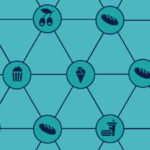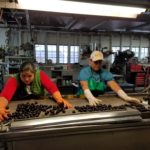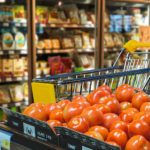Fair-trade coffee, quality guarantee, ecological tomatoes… consumers read the labels on the things they eat. But is there any way of checking that what they say is correct? In order to do so, you would need a register of the processes to which the product has been submitted, something blockchain can do.

Diet has an impact on health. The World Health Organization (WHO) estimates that some 600 million people – almost one out of every 10 inhabitants – become ill each year as a result of eating contaminated food, and 420,000 die as a result.
From supply chain to blockchain
Globalization has turned supply chains into extensive networks that cross several national borders. At each stage, an apple goes through different forms of treatment and places, during which it can be contaminated or suffer a deterioration in quality. Guaranteeing the safety of products depends on collaboration, confidence and transparency among different agents from the moment they leaves the farm until they reach the table.
Blockchain technology works like an accounting ledger, in which everyone involved records their movements and to which everyone has access. It’s a decentralized system in which each block is created with encrypted information and inextricably linked to the next and the previous block, in so that it is almost impossible to hack.

A blockchain can be used for any transaction or contract that requires verification and security. Tech giant IBM has started to use this technology with companies such as Nestlé and the supermarket chain Walmart in order to prioritize consumer health. IBM Blockchain Platform provides a digital reading of the register of each of the processes to which a product has been submitted.
As Frank Yiannas, vice president for food safety at Walmart explains that before blockchain, tracing a food item from the shop to its source would take a number of days. However, with blockchain technology, this information is available in barely two seconds.
Time is a key factor when dealing with a problem of food safety. You have to act quickly to avoid illness, or even death. It’s also important to do so in the correct manner. According to Yianna, knowing which products have been affected and which have not, reduces losses and helps to quickly repair any damage to the brand.
Investment in prevention is better than a cure
When over 54,000 children were hospitalized in 2008 because of a resin that had contaminated a baby milk brand, the OwlChain electronic commerce platform decided to develop a system to prevent another unwelcome incident of this nature from happening. The Taiwanese company made available to farmers OwlChain Provenance, a tool based on blockchain technology that allows the whole lifecycle of pigs to be traced. By scanning the product code at the supermarket, you can tell where and when the purchased animal was born, its medical history and even what it was fed throughout its life.

Transparency feeds confidence
It ‘s not just a matter of avoiding serious cases of food contamination. Consumers want to know where their food comes from and whether what they are being offered is genuine. Is it as healthy and nutritious as they say? According to the Axiom group, only half of customers believe what is on the label. Consumers demand transparency in information on food; they want to know if it is fresh, where it comes from and whether additives and artificial preservative have been added to it.
To meet this demand, Axiom has launched Geneisis, a platform that facilitates the registration and tracing of all the processes in the supply chain. This benefits both sellers and buyers, with the former being able to demonstrate the authenticity of their product, while the latter has easy access to all the information on the blockchain.
The company arc-net aims to protect the interests of current and future consumers. In conjunction with PwC, it is working against food fraud in the Netherlands. The adulteration and falsification of products is a growing problem, according to PwC, with an estimated cost to the global economy of between 24 and 32 billion euros a year. Companies lose money and customers confidence. More than just a financial problem, food fraud can become a public health problem.
However, food is not the only important thing. Everything involved in the supply chain has to be kept in mind. Provenance, whose product traceability is used by more than 200 food companies, gets on board producers, suppliers and retailers to create a data base that verifies the origin of the fair-trade coffee sold by the supermarket on the corner, as well as the fairness of the wages received by Indonesian farmers.
The world is increasingly complex and offers more choice. Making information available in a rapid and simple form serves, not only to help consumers make the right choice, but also to reassure them that they are buying what they want. Tracing, verification and confidence: blockchain technology has become an ally of the consumer and human welfare.